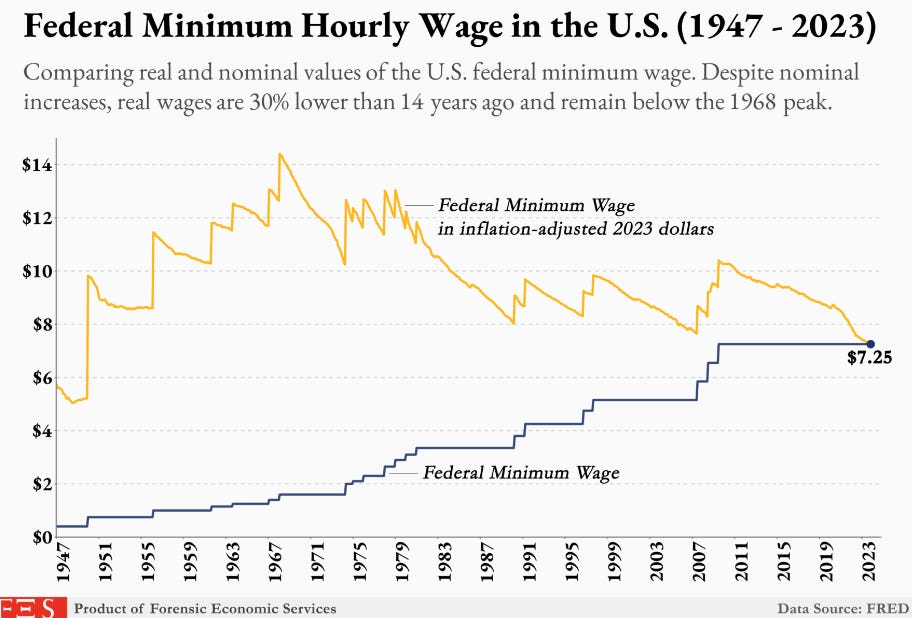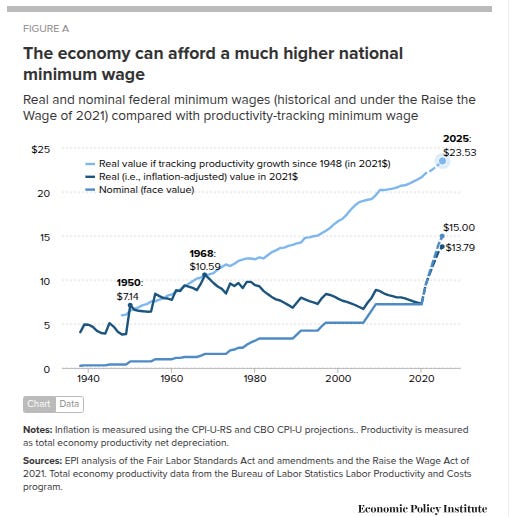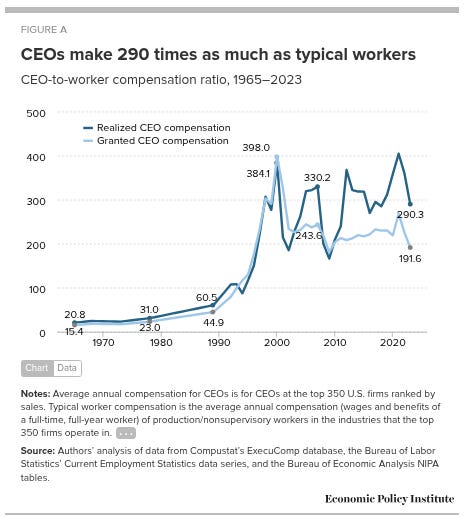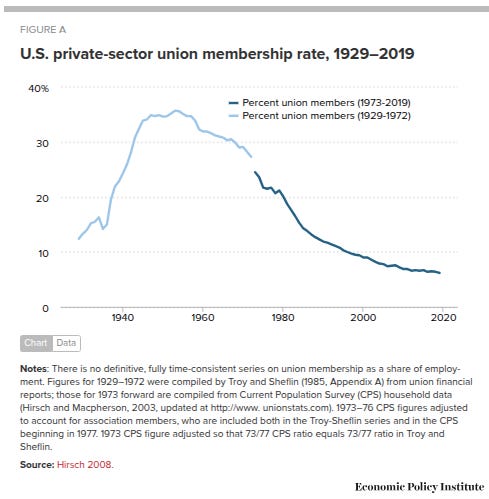Workers Deserve Better
The United States is governed by the interests of a small number of wealthy elites. That isn’t what our Republic, founded as a government of the people, by the people, for the people, was ever meant to be. A revolution was fought to eliminate the ruling class and empower the many. It's time to fight our way back there, and it will take a united effort to succeed.
Workers deserve better.
America has evolved into a society that worships CEOs. The more billions they make, the more attention, respect, and power they obtain. Their wealth has ballooned to such an extent that they’re buying media companies, creating their own space programs, renting out Venice for their weddings, even influencing presidential elections and buying government positions.
A unique mythos is formed around each billionaire, telling the tale of how all their success was due to their personal control over every aspect of the business, down to the last screw. A fiction so well crafted that as we dread how we’re going to pay the rent next month or fill the empty fridge with a maxed out credit card, we still marvel at their yachts that are so big they need another smaller yacht to be able to go on excursions to their private islands where they hang their original Victorian era works of art.
It is time to destroy the myth of the self-made man.
Jeff Bezos had a good idea about setting up an online store to get goods to customers in the digital age, but he didn’t create the internet; the government did, using your tax dollars. He also didn’t create America’s infrastructure or roads and railways; again, taxpayers funded that. And Bezos doesn’t stock the warehouses, fill the orders, ship the products, or manage customer service; millions of workers do. Amazon wouldn’t be possible or successful without all of those things.
Bezos deserves to be rich for building a successful company, but not with a total compensation that is 1,200,000 times that of the median Amazon worker. His compensation is so high that he earns the entire lifetime salary of the average American worker in just 13 minutes. That’s a problem.
The median annual salary for a full-time Amazon worker was approximately $37,000 in 2020. Adjusting that to 2024 dollars, that isn’t a livable wage for a single adult with no children in any state except Mississippi, where it just barely meets the mark. And being the median salary means that many Amazon workers are earning less than that amount.
Then there are the reports of poor working conditions, including employees feeling they don’t even have a chance to take a bathroom break, so they urinate in bottles during their shifts. OSHA cited Amazon for hazardous conditions that led to injuries. How much was Amazon, one of the largest companies in the world with $637 billion in annual revenue, fined for these issues and injuries? A mere $145,000.
America is not holding corporations accountable for their illegal practices and unfair pay.
Let’s start with the easiest part for Congress to fix: the federal minimum wage, which has been stuck at $7.25 for 16 years and is officially a poverty wage in every state in the country. This wasn’t always the case. In the late 1960s, the federal minimum wage was at its peak and was a livable wage. Having a livable wage for the minimum wage is not only the ethical thing to do, but it also pushes up middle-class wages. Back then, a single middle-class income could afford a house and cover the costs of an entire family. Not anymore.
Here is a chart of the federal minimum wage over time, adjusted for inflation up to 2023. Today, the federal minimum wage is worth less than half what it was in 1968.
However, that is just considering the minimum wage with the value of the dollar. Once we factor in productivity gains, the situation is even worse. The following graph is from 2021, courtesy of the Economic Policy Institute, as part of their research on the effects of raising the minimum wage to $15 an hour. It shows what the minimum wage would be if it had kept up with productivity gains, a whopping $23.50 an hour. Even more remarkable is that it shows the federal minimum wage kept pace with productivity during the 1950s and 1960s. The big corporate push into political lobbying in the 1970s dramatically changed that situation.
Corporations utilize their lobbying force to change the rules in their favor by buying influence over politicians. Sometimes, the rules don’t change; they go unenforced, as seen with antitrust laws. Over the last several decades, antitrust enforcement has dropped substantially, and the results speak for themselves.
Three companies control approximately 80% of the mobile telecommunications market.
Three have 95% of credit cards.
Four have 70% of airline flights within the U.S.
Google alone handles 60% of internet searches.
Four companies control 85% of corn seed and 75% of soybean seeds.
Four control 85% of the beef market, 66% of the pork market, and 50% of the chicken market.
Four companies control 65% of the grocery store market, and another four control almost 80% of the typical grocery items on the shelves.
The list goes on and on.
Monopolies are detrimental to consumers because they raise prices, hinder innovation, and limit product variety. They’re bad for workers because it means there is less competition for employees, which results in lower wages. But they’re great for CEOs. Since 1978, CEO pay has increased by 1085%, while worker pay has risen only 24%. This has created the massive gap between CEO and average worker pay.
At the same time that corporations were reducing regulation and enforcement, they were striving to eliminate unions. Unions give workers power through collective bargaining, which is used to gain proper wages and benefits. As unions were dismantled, so was the middle class.
This is the problem with the self-made fallacy and CEO worship. It undermines the hard work millions of Americans do every day and overly rewards the CEOs who don’t pay livable wages or provide proper working conditions. How does America turn this around?
Increase the federal minimum wage by $2.50 per year over the next five years, and then automatically adjust it to keep pace with inflation.
Empower unions and enforce anti-union busting laws.
Increase penalties for companies breaking laws from the insignificant rounding error they pay today to a meaningful percentage of the company’s annual revenue.
Increase taxes on businesses with a high ratio of CEO to worker compensation.
Reduce the standard 40-hour workweek to 30 or 32 hours.
Require all corporations to give at least 10% of board seats to representatives of the workers.
Require companies that give stock to executives to also set aside stock for the workers.
This type of change is only possible if workers unite. It takes millions of voices to counter the billions of dollars being spent to rig the system. We may disagree on many aspects of culture, but we should all agree that workers deserve a livable wage and to share in the success they create through their labor.
https://finance.yahoo.com/news/jeff-bezos-made-over-7-172628289.html
https://www.forbes.com/sites/johnmauldin/2019/04/11/america-has-a-monopoly-problem/
CEO Greed
They have used us, taken from us, even poisoned us. They flood Capitol Hill with lobbyists and use dark money to buy politicians. Regulations are a minor nuisance, resulting in fines costing pennies on the dollar, and the government looks the other way when antitrust laws are broken to gobble up the competition into giant monopolies. Corporations and th…







